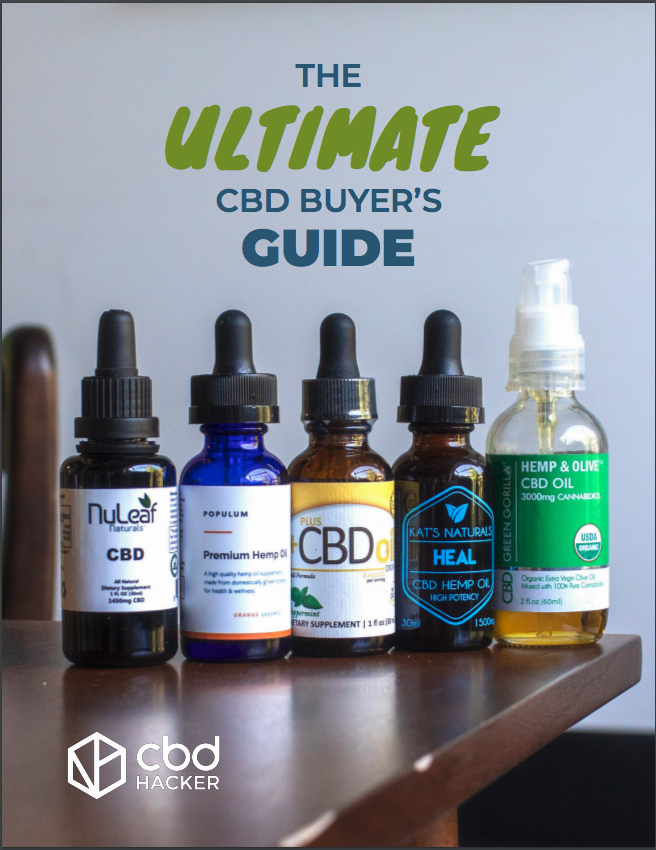When you buy a product from a brand that we recommend, we want you to have an amazing experience from start to finish. To ensure that you do, we subject each brand to a ridiculously thorough barrage of tests.
Read on to learn how we determine which products make it onto our lists!
Step one: selecting products
We put together a list of brands to consider, drawing from:
- Established, well-known brands
- Brands that have performed well in our previous rankings
- Newer brands that are generating buzz in user communities and the media
- Brands that have contacted us to request that we review their products
CBD Hacker receives some sample products from brands for free, and sometimes purchases products for review as well.
Our writers never know whether a sample was purchased or a free sample, so this does not impact our rankings. And sending us a sample does not guarantee a review — if a product doesn’t meet our standards, we don’t promote it. Period.
Step two: defining the scoring criteria
For our rankings, we typically score each product in these five main categories:
- User experience
- Customer service
- Reputation
- Transparency and accuracy
- Product quality and value
Let’s dig in to how we incorporate these data points to determine which brands make it into our rankings.
User Experience
A company could be offering the best product out there. But if the webstore crashes every time you try to make a purchase, then it doesn’t do you any good. That’s why we closely evaluate each company’s website for performance, design, and accessibility.
We also check to see how easy it is to find important information, from shipping and return policies to the ingredient lists for each product.
Customer Service
Among the top CBD companies, customer service is often the deciding factor that helps one brand stand out from the rest.
We only recommend companies that stand by their customers. If you have a question or a problem with your CBD product, you should be able to count on quick, friendly, and knowledgeable customer care.
We get the real scoop on how each brand treats their customers through secret-shopper-style research. We contact each company through email, phone, and social media to see how they handle typical questions and concerns.
In addition, we look for consumer-friendly policies. Some examples of business practices that can influence a company’s score include:
- Shipping policies
- Return policies and satisfaction guarantees
- Assistance programs
- Loyalty or rewards programs
Reputation
For the reputation category, we look at each company’s track record and its relationships with its customers.
We find out how long they’ve been in business, and look for media coverage — good or bad.
And we look at customer-generated reviews around the web to see what kinds of experiences people have had with a company over time. One review won’t make or break a brand’s score, but we do look for patterns and red flags.
We also check to see how each company interacts with customers. Do they respond professionally to critical feedback?
The best brands appreciate it when customers let them know about a problem, and they do whatever it takes to make things right. But when we see a brand arguing with a customer, or publicly berating them for a negative review, that makes us a lot less confident in recommending that brand.
Transparency and Accuracy
Transparency is massively important in the CBD industry.
For this category, we look at the types of information that each company is willing to share. Then, we evaluate how easy it is to access that information.
Most importantly, we send samples of each product to a third-party lab for CBD and THC potency tests. We then compare that analysis to the CBD quantity listed on each product’s label.
While some variation is to be expected in a natural product, we typically eliminate any product that contains less than 15 percent of the amount of CBD advertised.
And where companies share their own lab test results publicly, we look at how extensive, up-to-date, and easy-to-find their lab results were.
Product Quality and Value
The product category carries the greatest weight in our final scores. It’s also the category that varies the most from product to product.
We determine our scoring criteria based on what customers say they are looking for in each product category.
For example, when we evaluated CBD creams, we made sure to consider how long it took for each cream to absorb into the skin, and whether or not it left a noticeable residue. And for the capsules and softgels ranking, we measured each capsule to quantify the size.
But we always make sure to include the most important questions for consumers:
- Quality: What are the ingredients?
- Sourcing: Where does the hemp come from?
- Value: What is the price per milligram of CBD?
We work hard to eliminate bias as much as possible, so we used a blind testing process to record our subjective impressions of each product. Every sample is decanted into an identical container labeled only by number. Then, our team evaluates things like texture, flavor, and aroma.
Brand Partnerships
CBD Hacker is supported by affiliate links. That means that when you purchase a product through a link on our site, we may earn a small commission.
So, how do we keep these business relationships from affecting our rankings?
First, we only form affiliate partnerships with brands that have already met the rigorous standards described above.
Second, we rely heavily on blind testing and quantitative data to eliminate bias.
Third, our writers are not aware of the details of any business relationships with brands, and they don’t receive any renumeration for featuring one brand over another.
Fourth, we regularly review brands that do not have affiliate programs. In fact, the top-scoring brands in some of our rankings are made by companies with which we don’t have any business relationship at all. This sets us apart from most other CBD review sites, which will typically only review partner brands.
And finally, an affiliate relationship with a brand does not guarantee it a place in any ranking. To get a list of the top ten, fifteen, or twenty products in a category, we routinely evaluate far more brands than we can include in the final review. And sometimes that means that we have to decline to include one or more of our partner brands.

